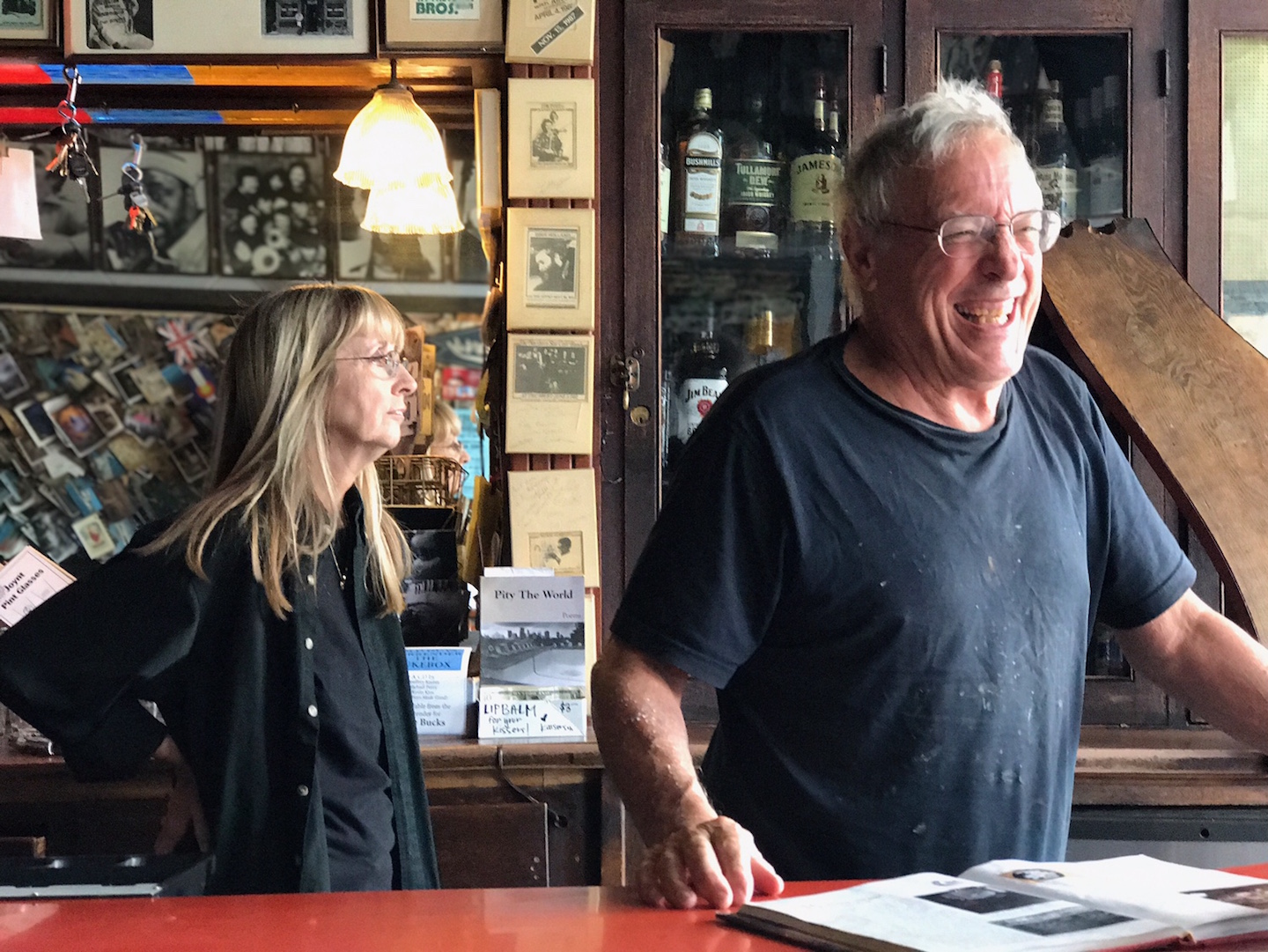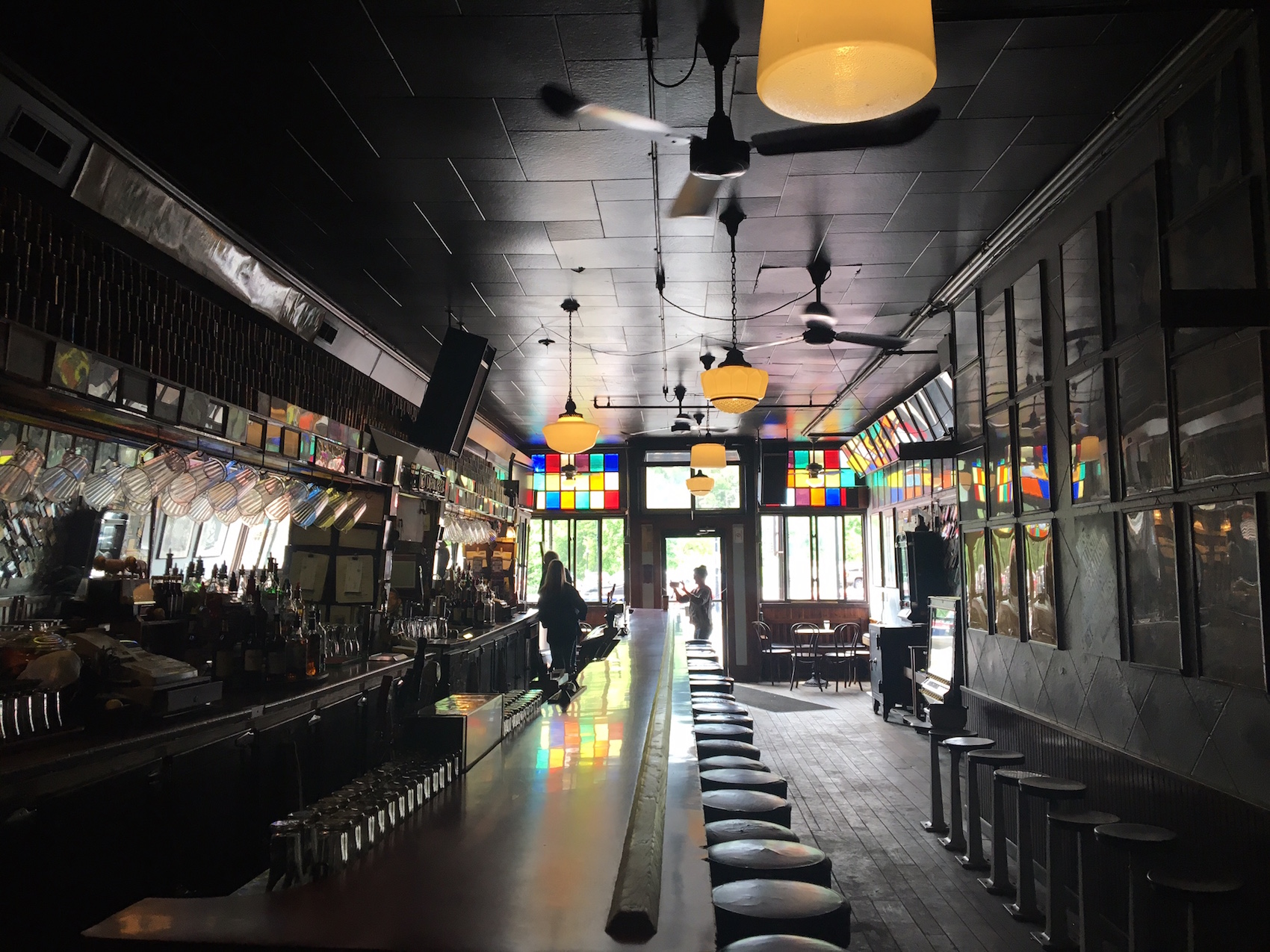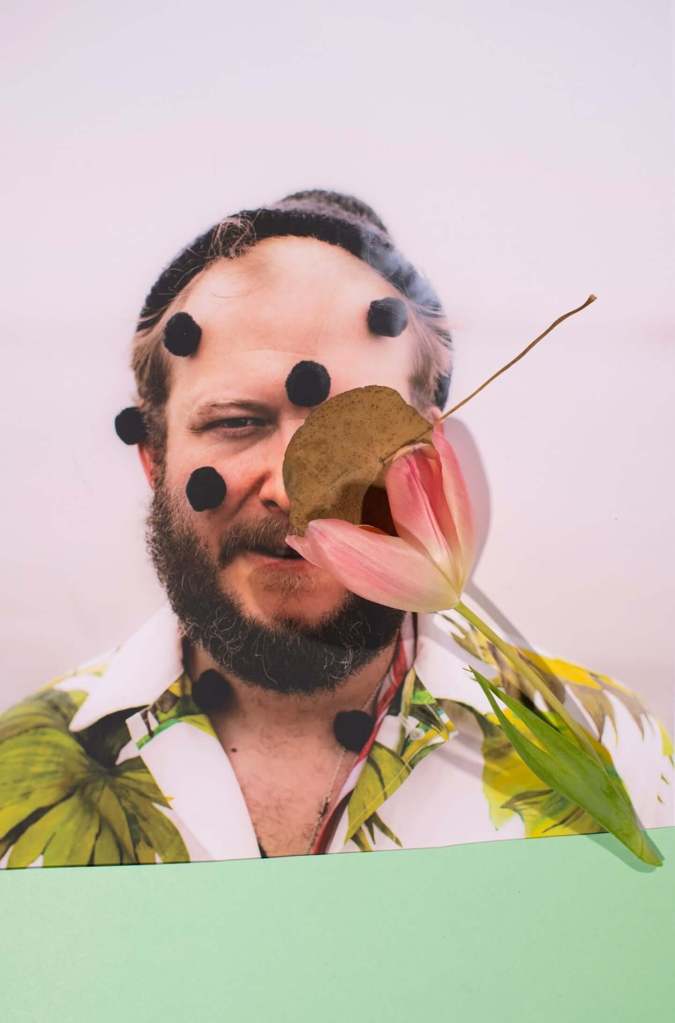We’re two hours into packing up our campsite at Eaux Claires—the music festival launched three years ago by Bon Iver’s Justin Vernon and The National’s Aaron Dessner, in Vernon’s hometown of Eau Claire, Wisconsin—when my sister discovers our car battery is dead because we’ve spent the weekend using it to charge our phones and play “Feeling Myself” while day drinking boxed wine. And, if you find yourself in Wisconsin with a dead car and a progressive political mindset, you ask the neighboring campers with a bumper sticker of former Wisconsin senator Russ Feingold for a jump. Feingold was the only senator to vote against the Patriot Act; you can trust a person who respects Russ Feingold.
Being as aggressively friendly as our Wisconsonite stereotype suggests, we get to chatting with the tall, middle-aged man hooking his pickup truck to ours. He hands me two of the cable clamps, reminds me to make sure they don’t touch lest the battery explodes, and asks if we liked the festival. We politely tell him yes, we liked it very much, that this is our second year here, and that we have enjoyed the thoughtful curation, the luminous charisma of Chance the Rapper, and the merciful efficiency of the shuttle system. His favorite part, he says, was Friday evening’s “Bon Iver Presents John Prine and the American Songbook” set, because his daughter and son were on stage singing alongside the country-folk legend.
Videos by VICE
And so this is how I meet Justin Vernon’s dad, Gil, who without being asked takes out his driver’s license to prove his identity as we wait for our engine to warm up.
“Somebody asked me, ‘What’s your role here?,’” Gil says, in his flat midwestern accent. “I said ‘I’m the chief taker inner.’ I just take it in and see how proud and satisfied so many people are.”

Photo by Montgomery Sheridan, courtesy of Eaux Claires
For the past three summers, the Vernons’ 68,000-person hometown has enjoyed the national attention and indie cachet of one of the most musically diverse festivals in the United States: Eaux Claires, named for the town’s original plural French spelling, which translates to “clear water” (City motto: “Here is clear water!”).
The festival, which intentionally caps attendance at roughly 20,000 (versus 100,000-plus at mainstream gatherings), has been praised as a boutique alternative to corporate mega-festivals with cookie-cutter lineups, overpriced amenities, and drunken hordes Snapchatting into the void. At Eaux Claires, the lines are short, tallboys are eight bucks, and you can drink them anywhere. Amen. This year’s lineup featured Paul Simon, Feist, Polica, Perfume Genius, Wilco, Danny Brown (who dressed in head-to-toe Carhartt and played “When It Rain” when it started to rain), Bon Iver collaborators Chance the Rapper and Francis and the Lights, and a surprise set from Jenny Lewis. There was also, of course, Bon Iver playing alongside Prine, who Gil says was a very big deal in the Vernon household when Justin and his sister Kim were growing up.
Gil, who looks to be in his 60s and has salt and pepper hair that matches his goatee, is the patriarch of the Vernon family campsite, where siblings, cousins, grandkids and friends have posted up for the weekend inside a few modest RVs and tents. The posh amenities one might expect of the festival’s first family include little more than string lights hanging from the trees. Their evenings hosted politely muted campfire chatter; in the mornings, the kids played catch. Gil’s young red-headed granddaughter tells me she plays the violin, recorder, piano, and will soon begin saxophone lessons.

I ask Gil what all this means means to him—that because of his son, his unassuming Wisconsin town becomes a cultural and creative flashpoint.
But Gil Vernon will be the first to tell you that the musical history of Eau Claire does not, in fact, revolve around the cachet of his Grammy-winning son, and is quietly host to star power that existed long before Justin befriended Kanye.
“This is an extension of things that have happened so many years ago, through the efforts and hard work and sacrifice of so many other people,” Gil says, sitting on the tailgate of his truck. “If I had to emphasize one word, it’s ‘extension’—it didn’t drop out of the sky.”
Eau Claire is like a lot of other towns in the state. Its historic main street is lined with two-story brick buildings erected at the turn of the century with lumber mill money, and surrounded by modest single family homes, fast food joints, the Wal-Mart, and the interstate, eventually giving way to farmland. There are three bars for every church, and church comes second to the Packers during football season. Its largely white, blue collar population voted for Hillary in the November election, though is in the minority of Wisconsin counties to do so. Time here passes slow and steady, marked by daily commutes to jobs at healthcare centers and home improvement chains, and the freeze and thaw of the Chippewa River. All of which is to say, the signs for Eau Claire’s Paul Bunyan Logging Camp Museum do not scream “musical hotspot.”

Photo by David Szymanski, courtesy of Eaux Claires
Gil, who works as an arbitrator, says that to truly understand the musical significance of Eau Claire, one must look to a few key sources. The first is the local newspaper Volume One, which offers smart takes on local arts and culture, avoiding the print decline because people just love reading it. (The most recent issue has an op-ed on why Netflix will never beat your local movie rental shop.) Gil also points to the Eau Claire public school system’s emphasis on music education. In addition to football and basketball, Justin played in jazz band, show band, and marching band (“all different instruments,” Gil proudly notes). During his senior year of high school, Justin’s Jazz 1 group was selected to play at New York’s Lincoln Center after auditioning for Wynton Marsalis’s Jazz At Lincoln Center program.
“There were fabulous bands from all over the country, and these kids showed them that, ‘Hey, we’re from little old Eau Claire, Wisconsin, and we’re holding our own,’” Gil says.
He grabs his laptop from the truck and scrolls through iTunes, past a copy of My Beautiful Dark Twisted Fantasy, to a recording of Justin singing “The Lady Is a Tramp” with the Eau Claire Memorial High School Jazz Band. He holds the Macbook up to our ears and we lean in to hear his son, known for his falsetto, here sounding like Frank Sinatra. (“It’s fabulous,” Gil says. “It’s just great.”) The project was a fundraiser for the group, who that night played classic jazz cuts and songs from Bon Iver’s 2007 breakout For Emma, Forever Ago. The performance was released in 2009 as an album called A Decade With Duke.
“He hates labels, ya know,” Gil says. “Good music is good music.”
But to understand the musical legacy of Eau Claire, Gil says, we’ve gotta go to The Joynt, a classic Wisco bar three miles away in the downtown historic district, and talk to the owner Bill Nolte.
So we do. The bar is closed (it is, to be fair, 11 AM on a non-football Sunday), but a man and woman who turn out to be Nolte and his longtime partner Kathy are inside, and they let us through the door after we tell them we know Gil, because this is how small(ish) towns work. Inside, the walls are covered with bumper stickers (“THE MORAL MAJORITY IS NEITHER,” “Beware of the Dance Police!”) and a banner rightly proclaiming, “All we are saying is give cheese a chance.” Bill is a gregarious man, white-haired with sparkling eyes and streaks of paint on his faded jeans. He talks a lot with little prompting, and he looks a bit like Nick Nolte, who happens to be his second cousin.

As it turns out, Bill Nolte is responsible for turning Eau Claire into a secret jazz stronghold during the 70s and 80s and paving the way for the city’s love of the genre and the music festival happening three miles down the road. Atop the bumper stickers on the wall hang framed photos of artists who have graced The Joynt’s modest backroom stage: Charlie Parker, Charles Mingus, Odetta, Queen Ida, McCoy Tyner, Dizzy Gillespie, Bobby Hutcherson, Bill Evans, John Lee Hooker, Loudon Wainwright III, and dozens of other legends. Nolte emphasizes that these people didn’t play here when they were on their way up; they played here when they were them.
“We put gas in their bus rather than them sitting in some hotel room between shows,” he says. “We became a destination because we paid them when they asked and were available when they needed us to be.”
Nolte graduated from Dartmouth in 1963, moved to Eau Claire from Chicago in 1972, and used his connections from the latter to book The Joynt’s first act, jazz pianist Ahmad Jamal, in January 1974. Tickets were free. He quickly realized artists were eager to play shows between their gigs in the surrounding larger markets—Chicago, the Twin Cities, Madison—and eventually came to love the atmosphere of the dark bar in little old Eau Claire. On show nights, bartenders would wrap the phone in towels and put it in a water pitcher so calls wouldn’t interrupt sets, and the pool table was moved to make room for the stage and dozens of folding chairs Nolte toted over in his Volkswagen.

Poets including Gary Snyder and Miller Williams, who read at Bill Clinton’s second inauguration and is father to Lucinda Williams, gave readings at the bar. Eau Claire’s first local Grammy winner, the pianist Geoff Keezer, played The Joynt when he was 15 years old, just a few years before Art Blakey would enlist him as a Jazz Messenger, eventually going on to record with Diana Krall. Keezer’s father Ron was on the faculty at UW Eau Claire’s renowned jazz program, which Nolte and Gil describe as fundamental in fostering the city’s love of the genre, manifesting in the annual Eau Claire Jazz Festival and The Chippewa Valley Jazz Orchestra. The Joynt did live music until 1989—the last show was by jazz guitarist Emily Remler, who died less than a year later at age 32. At that point, Nolte says he was just worn out.
He gives the same reason for not attending Eaux Claires—”my knees are shot, I’m too old to walk around, and I don’t like sitting on the ground”—but he gets along with the city’s most recent Grammy winner, who still lives in town. Justin occasionally stops by The Joynt, although now “bozos” always want to take his picture. One recent morning at the diner down the street, a star-struck server told Nolte that Justin Vernon was in the back having breakfast with some friends.
“So I went in and stood by the table and he said, ‘Bill, what’s up?’ and I said ‘Oh, hi! Somebody told me Leonard Cohen was here!’ He thought that was hilarious, but some of the kids in his posse didn’t think it was so funny. There’s the difference between Justin and a lot of people.”
Nolte hands me a single key and says to walk four doors down from the bar to his art gallery. He’s not coming with, he says, because he doesn’t want me to have to lie if I don’t like his stuff. Inside the little room hang paintings and a dozen wildly intricate shadowbox dioramas, several done in homage to artists including Cohen, Bob Dylan, Georges Seurat, Jackson Pollack, and M.C. Escher. Titles include “Bob Dylan’s Last Dream” and “There’s Always A Wall Being Built Somewhere.” Justin has bought several, Nolte notes, a few for some former girlfriends and one for his mother, Justine.
Back at the bar, Nolte admits he’s a touch skeptical, maybe even cynical, about Eau Claire’s status as a new hip musical capital. (“Oh good. Just what we wanted.”) He says he saw “little to no” community support when he was hosting some of the most important musicians in American history at his bar on Water Street. Working as a substitute teacher, Nolte occasionally gave dozens of show tickets out to faculty members, few of whom ever showed up. He says that the people who made a living teaching about music and art were jealous of people who made their money by actually playing and making it.

“Bill Nolte no doubt lost his shirt on all those shows, and you can’t write your piece unless you stop at the Joynt,” Gil had implored, back at the campsite. “You can’t. In this community, he’s a pillar.”
This is what places like Eau Claire offer: It’s heritage, and it’s kinship, for better and for worse. Small towns can be everything stereotypes suggest—provincial, narrow-minded, lacking in the diversity—but what they give us is the comfort of closeness: The door to the bar opens because you know Gil Vernon, strangers wave to you from their cars when you’re walking down the sidewalk, the whole family shows up at the campsite, and the festival founder’s dad will gladly jump your car. Small towns are where tradition happens, where generations compound on themselves and evolve the work of those that came before them, reminding us that success is never forged from the ether or a small cabin in the woods.
So if it feels like a reach to say that the The Joynt is responsible for Bon Iver and Eaux Claires, it’s also true, because on a Saturday night in 1979, Gil Vernon met his future wife Justine at the bar. Bill Nolte introduced them.
Katie Bain is so happy the car died. She’s on Twitter.




